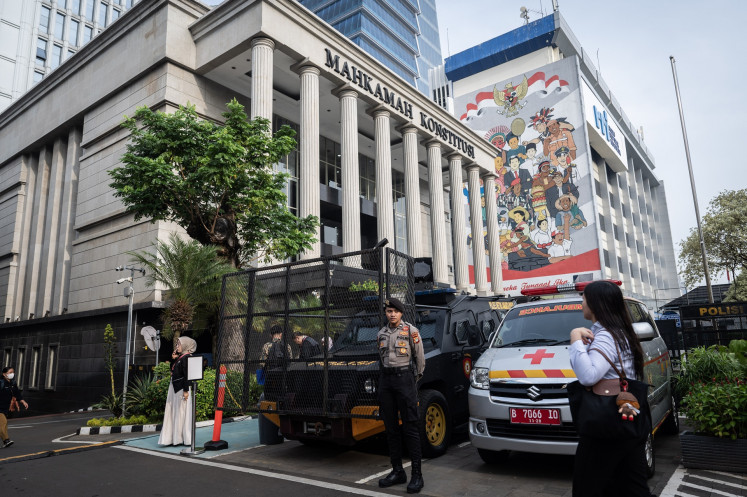Telkom suffers as ‘legacy services’ shrink
Most consumers in Indonesia have currently stopped or at least greatly reduced usage of short message service (SMS) and credit-based voice call, leading to decreased sales of the services in the past few years
Change text size
Gift Premium Articles
to Anyone

M
ost consumers in Indonesia have currently stopped or at least greatly reduced usage of short message service (SMS) and credit-based voice call, leading to decreased sales of the services in the past few years.
Dio, 23, a freelance designer based in Jakarta, virtually stopped using SMS and credit-based voice call roughly four years ago, which was around the time he got his first smartphone. Since then, he has been mostly using WhatsApp to text and call friends, family and clients.
“Except Go-Jek drivers. I still use voice call to contact them,” he said during a Saturday night dinner with his friends, who all nodded in agreement.
Dio and his friends also agreed that they began to stop using SMS when Blackberry Messenger (BBM) became popular in Indonesia. This was around 2006-2008. They then stopped using SMS and credit-based calls when WhatsApp and Android smartphones became popular or around the mid 2010s.
According to Telkom Indonesia, the country’s largest telecommunications company, SMS and credit-based voice call, which are collectively known as “legacy services” in the telecommunications industry, are becoming “increasingly irrelevant in supporting customers’ activities and businesses”, to quote its 2018 annual report.
The report shows digital service sales increased 23.3 percent from Rp 66.82 trillion (US$4.6 billion) in 2017 to Rp 82.39 trillion this year. In comparison, legacy service sales decreased 22.76 percent from Rp 47.9 trillion to Rp 37 trillion in the same time frame.
Thus, even though Telkom’s annual revenue slightly increased (1.9 percent) from Rp 128.26 trillion in 2017 to Rp 130.78 trillion last year, profits sharply declined by 19 percent from Rp 22.15 trillion in 2017 to Rp 18.03 trillion last year due to the drop in legacy service usage.
However, Telkom is not the only telecommunications company to have had a bad year in 2018. The country’s second and third largest operators, Indosat and XL, recorded respective net losses of Rp 2.40 trillion and Rp 3.3 trillion last year.
“2018 is a year that should be forgotten,” Ririek Adriansyah, who officially replaced Alex Sinaga as president director of Telkom last week, told reporters at a recent media gathering in Bali.
“Our industry has shrunk. The big three players recorded a combined negative growth 7.3 percent last year. But, alhamdulillah [thank God], the revenue of Telkomsel [Telkom’s mobile operator subsidiary and spearhead for growth] only declined by 4.7 percent,” he said.
Ririek added that a price war between telecommunication providers was another major cause of the decline in sales.
However, Telkom is optimistic about growth this year. This is firstly because the government introduced a regulation two years ago that restricts individuals to a default maximum of three phone numbers each.
Even though the regulation would hurt sales in the short term, the company expects it to help overcome the price war in the long term.
Ririek also pointed to the company’s first quarter financial statement, which shows revenue alone reached Rp 34.84 trillion, higher than the Rp 32.34 trillion recorded in the same period last year. First quarter net profit also increased to Rp 6.2 trillion this year, higher than the Rp 5.73 trillion last year.
“This year, we will try to slow down the decline in legacy service sales but we will also push our digital services. While legacy services contributed 37 percent [to last year’s revenue], digital services contributed 63 percent. Thus, we expect the growth of digital to compensate for the decline in legacy,” he said.
Telkom “delayed” the decline in legacy services by introducing several SMS and voice call promotions last year. The company also spent nearly US$2.15 billion (excluding $150 million for a satellite) in building its 4G mobile internet capabilities in the same period. The investments included installing 28,500 new 4G-capable base transceiver stations (BTSs) and laying down fiber optic cables.
Financial director Harry Mozarta Zen said the company was targeting “mid to high single growth” this year. Growth of 3 to 9 percent in other words. Given the company’s 2018 revenue, its target would be between Rp 134.7 trillion and Rp 142.6 trillion this year.
He added that capital expenditure was targeted at 27 percent of this year’s revenue. This is higher than the 25.7 percent allocated last year. Given this year’s growth target, his statement would translate to a capex target of between Rp 36.4 trillion and Rp 38.5 trillion.
“Around 40 to 50 percent of the capex will be used for mobile related purpose for both Telkom and Telkomsel. We will have many activities to boost our mobile connectivity business,” he said.









